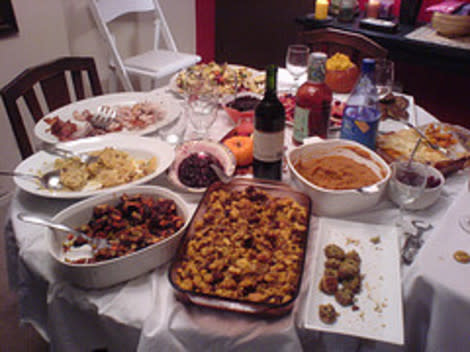10 Simple Steps to Reduce Holiday Food Waste
by Robin Shreeves, Mother Nature Network

Here's a horrible, but not really surprising, statistic. Between Thanksgiving and New Year's Day, our food waste triples in the United States. To help combat that waste, the Worldwatch Institute offers 10 simple steps we can take to help make this season less wasteful and more plentiful. Before the meal: Plan your menu and exactly how much food you'll need. 1. Be realistic: The fear of not providing enough to eat often causes hosts to cook too much. Instead, plan how much food you and your guests will realistically need, and stock up accordingly. The Love Food Hate Waste organization, which focuses on sharing convenient tips for reducing food waste, provides a handy "Perfect portions" planner to calculate meal sizes for parties as well as everyday meals. 2. Plan ahead: Create a shopping list before heading to the farmers market or grocery store. Sticking to this list will reduce the risk of impulse buys or buying unnecessary quantities, particularly since stores typically use holiday sales to entice buyers into spending more. During the meal: Control the amount on your plate to reduce the amount in the garbage. 3. Go small: The season of indulgence often promotes plates piled high with more food than can be eaten. Simple tricks of using smaller serving utensils or plates can encourage smaller portions, reducing the amount left on plates. Guests can always take second (or third!) servings if still hungry, and it is much easier (and hygienic) to use leftovers from serving platters for future meals. 4. Encourage self-serve: Allow guests to serve themselves, choosing what, and how much, they would like to eat. This helps to make meals feel more familiar and also reduces the amount of unwanted food left on guests' plates. After the meal: Make the most out of leftovers. 5. Store leftovers safely: Properly storing our leftovers will preserve them safely for future meals. The U.S. Department of Agriculture recommends that hot foods be left out for no more than two hours. Store leftovers in smaller, individually sized containers, making them more convenient to grab for a quick meal rather than being passed over and eventually wasted. 6. Compost food scraps: Instead of throwing out the vegetable peels, eggshells, and other food scraps from the making of your meal, consider composting them. Individual composting systems can be relatively easy and inexpensive, and provide quality inputs for garden soils. 7. Create new meals: If composting is not an option for you, check out Love Food Hate Waste's creative recipes to see if your food scraps can be used for new meals. Vegetable scraps and turkey carcasses can be easily boiled down for stock and soups, and bread crusts and ends can be used to make tasty homemade croutons. 8. Donate excess: Food banks and shelters gladly welcome donations of canned and dried foods, especially during the holiday season and colder months. The charity group Feeding America partners with more than 200 local food banks across the United States, supplying food to more than 37 million people each year. To find a food bank near you, visit the organization's Food Bank Locator. 9. Support food-recovery programs: In some cases, food-recovery systems will come to you to collect your excess. In New York City, City Harvest, the world's first food-rescue organization, collects about 28 million pounds of food each year that would otherwise go to waste, providing groceries and meals for more than 300,000 people. Throughout the holiday season: Consider what you're giving. 10. Give gifts with thought: When giving food as a gift, avoid highly perishable items and make an effort to select foods that you know the recipient will enjoy rather than waste. The Rainforest Alliance, an international nonprofit, works with farmers and producers in tropical areas to ensure they are practicing environmentally sustainable and socially just methods. The group's certified chocolates, coffee, and teas are great gifts that each have a long shelf-life, and buying this kind of gift helps support businesses and individuals across the world.
Related on the Mother Nature Network:
Gallery: Presidential turkey pardons throughout history
How to keep guests from feeding your dog Thanksgiving leftovers
How to keep a gluten-free guest safe this Thanksgiving
4 alternative Thanksgiving celebrations
More articles about Thanksgiving
